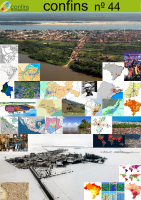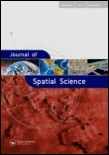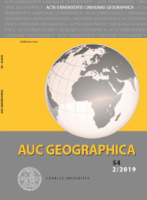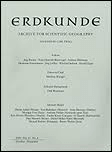
GEOgraphia-UFF
Scope & Guideline
Navigating the Landscape of Contemporary Geography
Introduction
Aims and Scopes
- Political Ecology and Environmental Justice:
The journal focuses on the intersections of political ecology, environmental justice, and socio-environmental conflicts, highlighting how these issues affect various communities, particularly in Brazil. - Spatial Analysis and Geographic Information Systems (GIS):
GEOgraphia-UFF employs quantitative and qualitative spatial analysis techniques, including GIS and remote sensing, to study land use, environmental changes, and urban dynamics. - Cultural Geography and Identity:
The journal explores cultural geography, emphasizing the role of identity, race, gender, and social movements in shaping spatial practices and community dynamics. - Historical and Theoretical Perspectives:
The journal integrates historical analyses and theoretical frameworks to understand contemporary geographical issues, drawing from decolonial and critical geography perspectives. - Health Geography:
Research related to health geography is a key focus, examining the spatial dimensions of health crises, such as the COVID-19 pandemic, and their implications for public health policies.
Trending and Emerging
- Decolonial Approaches in Geography:
There is a growing emphasis on decolonial perspectives within geographic research, exploring how colonial histories shape contemporary spatial practices and power relations. - Health Geography in Context of Pandemics:
Recent publications have increasingly focused on health geography, particularly in the context of the COVID-19 pandemic, examining spatial inequalities and public health responses. - Social Movements and Resistance:
Research on social movements, particularly those advocating for land rights and environmental justice, is gaining traction, reflecting a broader interest in activism and community resilience. - Integration of Technology and Geography:
Emerging themes include the use of geotechnologies and data analytics in geographic research, highlighting the need for innovative methodologies to address complex spatial problems. - Cultural and Ethnic Geography:
The journal is increasingly publishing studies that explore the cultural and ethnic dynamics within geographical contexts, particularly in relation to identity and representation.
Declining or Waning
- Traditional Physical Geography:
There is a noticeable decline in studies focused solely on traditional physical geography, such as geomorphology and climate studies, as the journal increasingly emphasizes socio-political and cultural dimensions. - Geography of Globalization:
Research centered on globalization and its impacts on local geographies appears less frequently, suggesting a shift towards more localized studies that prioritize community perspectives. - Conventional Urban Studies:
Papers discussing conventional urban studies without a critical lens on social issues or political contexts are becoming less prominent, indicating a move towards more interdisciplinary approaches.
Similar Journals

Confins-Revue Franco-Bresilienne de Geographie-Revista Franco-Brasileira de Geografia
Navigating the Intersections of GeographyConfins-Revue Franco-Bresilienne de Geographie-Revista Franco-Brasileira de Geografia is a distinguished academic journal dedicated to the dynamic field of geography, bridging insights between French and Brazilian perspectives. Published by REVUES ORG, this journal has been embracing an Open Access model since 2007, ensuring that research is disseminated widely and freely accessible for all scholars, practitioners, and students. With its robust commitment to promoting interdisciplinary dialogue, Confins supports the exploration of various geographical themes ranging from urban studies to environmental challenges, contributing significantly to the global understanding of geographical phenomena. The journal aims to foster collaboration and intellectual exchange, highlighting critical contemporary issues while adhering to rigorous academic standards. Based in Paris, this publication stands as a pivotal resource for advancing geographical knowledge and a must-read for those engaged in research and professional practice in the field.

Journal of Spatial Science
Transforming Understanding of Our Spatial WorldThe Journal of Spatial Science, published by Taylor & Francis Ltd, serves as a prominent platform for the dissemination of research in the interdisciplinary fields of geography, atmospheric science, and energy. With an ISSN of 1449-8596 and an E-ISSN of 1836-5655, this journal has established itself as a vital resource since its inception in 2004, boasting an impressive convergence period extending to 2024. Recognized in the Q3 quartile for Atmospheric Science and Energy (miscellaneous), and achieving a Q2 classification in Geography, Planning and Development in 2023, the journal not only reflects the evolving complexities of spatial science but also underscores its increasing relevance in addressing contemporary global challenges. The journal holds a commendable position in Scopus rankings, with notable placements in various categories, further highlighting its academic significance. Researchers, professionals, and students are encouraged to engage with the rich content offered, as the Journal of Spatial Science remains committed to advancing knowledge and fostering discussions pertinent to spatial analysis and its applications.

AUC Geographica
Connecting Scholars in the Realm of Earth SciencesWelcome to AUC Geographica, a distinguished journal published by CHARLES UNIV PRAGUE, KAROLINUM PRESS, focusing on the expansive and interdisciplinary fields of Earth and Planetary Sciences, as well as Geography, Planning, and Development. With an ISSN of 0300-5402 and an E-ISSN of 2336-1980, this Open Access journal has been freely accessible since 2010, allowing researchers, professionals, and students to engage with high-quality scholarly articles without barriers. As of 2023, it holds a Q4 ranking in its respective categories, reflecting its commitment to contributing to the academic discourse despite competitive landscapes. Located in Prague, Czech Republic, at OVOCNY TRH 3/5, PRAGUE 1 116 36, AUC Geographica aims to foster collaboration and innovative research in the multifaceted relationships between human activities and the natural environment. With a publication history spanning from 1975 to 2024, this journal continues to be a vital resource for those seeking to advance knowledge and explore new dimensions in geography and Earth sciences.

Cadernos de Geografia
Advancing Knowledge in Geography and BeyondCadernos de Geografia is a distinguished biannual journal published by UNIVERSIDADE DE COIMBRA, FACULDADE DE LETRAS, dedicated to the field of geography and related social sciences. With its ISSN 0871-1623 and E-ISSN 2183-4016, this journal has been a prominent platform for the dissemination of high-quality research since it became open access in 2012. Situated in Coimbra, Portugal, it aims to foster academic excellence by providing an inclusive space for innovative studies that explore contemporary geographical issues. Cadernos de Geografia encourages submissions that address diverse aspects of geography, ranging from environmental studies to urban planning, making it an invaluable resource for researchers, professionals, and students alike. As a part of the growing trend in open-access publishing, it enhances the global reach and accessibility of geographical research, thereby contributing to the enrichment of knowledge in the field.

Journal of Spatial Information Science
Innovating Research at the Intersection of Geography and TechnologyThe Journal of Spatial Information Science is a premier open-access journal published by the University of Maine, dedicated to advancing research in the interdisciplinary fields of spatial information science, geography, and computer science. With an ISSN of 1948-660X, this journal has established itself as a significant contributor to the academic community since its inception in 2010, achieving notable rankings as evidenced by its classification in the Q2 quartile across multiple categories, including Computers in Earth Sciences and Geography. The journal offers a platform for innovative research, fostering collaboration and knowledge dissemination among researchers and practitioners. Its impact is further underscored by its Scopus rankings, placing it in the top percentiles across critical disciplines. With Open Access options available, the Journal of Spatial Information Science ensures that high-quality research is accessible to a broader audience, promoting the ongoing development of the field through thoughtful and rigorous academic inquiry.

Documents d Analisi Geografica
Connecting Scholars and Ideas in Geography and PlanningDocuments d'Anàlisi Geogràfica is a distinguished academic journal published by Universitat Autònoma de Barcelona, focusing on the fields of geography, planning, and earth-surface processes since its inception in 1988. With an Open Access policy implemented in 2012, the journal aims to facilitate the widespread dissemination of geographical research and insights, accessible to a global audience. Currently ranked in Q3 for both Earth-Surface Processes and Geography, Planning and Development categories, it serves as a vital platform for researchers, practitioners, and students to share their findings and enhance knowledge in these critical fields. The journal is indexed in Scopus, where it stands at rank #470 in Social Sciences and #106 in Earth and Planetary Sciences, reflecting its growing impact in relevant academic communities. Based in Barcelona, Spain, Documents d'Anàlisi Geogràfica continues to contribute substantially to geographical scholarship by exploring contemporary issues and advancements in a rapidly evolving world.

Geoadria
Cultivating Innovative Perspectives on Earth SciencesGeoadria, an esteemed Open Access journal published by the University of Zadar in Croatia, has been at the forefront of disseminating valuable research since its inception in 1996. With a keen focus on atmospheric science, demography, earth-surface processes, and geography, this journal serves as a crucial platform for researchers and professionals aiming to explore the intricate relationships between these fields. Although it currently holds a Q4 quartile ranking in various categories, such as Atmospheric Science and Geography, its commitment to promoting innovative scholarly dialogue ensures its relevance and utility within the academic community. Geoadria is indexed in Scopus, with rankings that reflect its ongoing contribution to the social sciences and earth sciences, notably garnering attention in niche areas. With a dedication to open access since 1996, the journal stands as a testament to the University of Zadar's commitment to enhancing global knowledge. Researchers, professionals, and students interested in geography, demography, and environmental sciences will find Geoadria a vital resource for the latest empirical studies and theoretical discussions.

Geo UERJ
Navigating the Landscape of Environmental StudiesGeo UERJ is a renowned open-access journal published by Universidade do Estado do Rio de Janeiro (UNIV ESTADO RIO JANEIRO), focused on the multifaceted study of geography and related disciplines. Established to foster innovation and disseminate high-quality research, Geo UERJ has been dedicated to making scholarly work accessible since its transition to open access in 2007. The journal aims to provide a platform for researchers, professionals, and students to share insights into geographical phenomena, environmental issues, and urban studies, contributing to the global discourse on sustainability and spatial analysis. Its publications serve as valuable resources for academicians looking to stay abreast of cutting-edge developments within the geography field. With the ISSN 1415-7543 and E-ISSN 1981-9021, Geo UERJ invites contributions from diverse perspectives, enriching the academic landscape with important geographic research from Brazil and beyond.

Erdkunde
Fostering Dialogue in Geography and Earth SciencesErdkunde is a pivotal academic journal published by the Geographisches Institut, University of Bonn, dedicated to the fields of Geography, Earth and Planetary Sciences, and Ecology. With a history dating back to 1976, this journal serves as a platform for interdisciplinary research and discourse, reflecting diverse perspectives from both theoretical and applied dimensions within these domains. Published in Germany, it currently holds a respectable position within the academic community, classified in Q2 for Geography, Planning and Development and Q3 in Ecology and Earth and Planetary Sciences. Although not an open-access journal, its contribution is significant, offering insights that advance our understanding of spatial dynamics and environmental processes. With Scopus rankings that place it within the median range, Erdkunde is an essential resource for researchers, professionals, and students looking to deepen their knowledge and engage with contemporary trends in geographic research.

Boletin Goiano de Geografia
Connecting Scholars for a Sustainable FutureBoletin Goiano de Geografia is a distinguished academic journal dedicated to the field of Geography, published by the Universidade Federal de Goiás, Instituto de Estudos Socio-Ambientais. Since its inception in 1981, this Open Access journal has provided invaluable insights into the geographical dynamics of Brazil and beyond, promoting scholarly research and dialogue among geographers, environmentalists, and social scientists. The journal seeks to advance knowledge through the dissemination of research articles, reviews, and case studies that address contemporary issues in human and physical geography. With a commitment to fostering interdisciplinary collaboration, Boletin Goiano de Geografia serves as a vital resource for researchers, professionals, and students seeking to explore the complex interactions between society and the environment. Situated in the vibrant academic landscape of Goiana, Brazil, this journal enhances the global discourse on geographical studies and sustainability.